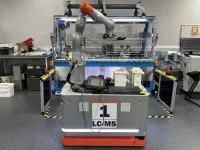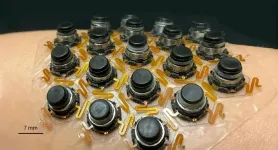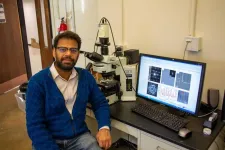(Press-News.org) OXFORD, Miss. – For parents of children with disabilities, finding time to focus on themselves may be difficult. However, a new study finds that the right coping strategies and resilience can significantly help manage the challenges of raising children with special needs.
That is the key finding from research published in the International Journal of Developmental Disabilities that studied families with neurodevelopmentally disabled children in Ghana to see what helps parents cultivate healthy, happy lives for themselves and their children.
“Our main interest was looking at how psychological distress and coping with stress impact these parents, their resilience and also their quality of life or well-being,” said Francis Boateng, University of Mississippi associate professor of criminal justice and legal studies.
“We know that it's not easy. These parents go through a lot of challenges.”
Despite the study being conducted overseas, the findings apply to all parents of neurodevelopmentally disabled children, Boateng said. Neurodevelopmental disabilities – which affect brain development and function – include conditions such as Tourette’s syndrome, autism spectrum disorder, attention deficit hyperactivity disorder and cerebral palsy.
Regardless of the severity of the child’s condition, any neurodevelopmental disability increases distress in the parent.
“Psychological distress predicted quality of life,” said Mabel Oti-Boadi, senior lecturer at the University of Ghana's Department of Psychology and lead author on the study. “When a parent has high levels of psychological distress, it reduces their quality of life, and there's also a direct effect on parents’ resilience.”
The researchers found that emotion-focused coping increases resilience in these parents. Emotion-focused coping is a strategy for managing stress by regulating a person’s emotional response as opposed to looking for ways to solve the problem directly. Having a child with a neurodevelopmental disability is out of the parent’s control, but the parent’s emotions surrounding that subject are not.
This approach is useful when dealing with circumstances that are beyond one's control, Boateng said.
"Prior studies have observed that this type of coping strategy does have a negative impact on their quality of life, but we didn't find any such results in our study, and that is surprising,” he said.
The researchers hope their results will inform decisions at the community and policy level to support parents of neurodevelopmentally disabled children.
In Ghana, many conditions that are considered neurodevelopmental disabilities are stigmatized, with parents bearing the brunt of the blame. The United States, too, still has vestiges of stigma surrounding disabled people and children with disabilities.
“In this part of our world, many have certain spiritual or cultural beliefs that these conditions are the result of some spiritual punishment and curse,” Oti-Boadi said. “That puts stress on these families because many feel isolated and are not able to have a job or use transportation, so they withdraw from everything.”
Instead, the researchers hope to foster social supports such as family, friends or the community. Group therapy sessions allow parents to connect with others like them and feel less alone, the researchers said.
“Parents are rising up above their problems, and they are bouncing back from the stresses they are going through," Oti-Boadi said. “They're creating awareness and hoping something good will come out of this for their families.
“Every one of us – whether you are in the West or in a developing country – we should all work together to help these families and build their resilience. When we are strong together, we can take on these problems.”
END
Coping and resilience aids parents of disabled children, study says
New research uncovers strategies to support parents of kids with disabilities
2024-11-06
ELSE PRESS RELEASES FROM THIS DATE:
Lupus Research Alliance announces inaugural recipients of Translational Bridge Award
2024-11-06
New York, NY. November 6, 2024. The Lupus Research Alliance (LRA) is excited to announce the first-ever recipients of the Translational Bridge Award (TBA), established this year to accelerate the translation of groundbreaking research into potential treatments and diagnostics for lupus. The award aims to propel high-potential projects from LRA-funded foundational discoveries with strong commercialization potential or an opportunity for clinical evaluation. Five exceptional researchers have been awarded the 2024 Translational Bridge Award to tackle pressing ...
Brain stars hold our memories
2024-11-06
A study published in Nature by researchers at Baylor College of Medicine changes the way we understand memory. Until now, memories have been explained by the activity of brain cells called neurons that respond to learning events and control memory recall. The Baylor team expanded this theory by showing that non-neuronal cell types in the brain called astrocytes – star-shaped cells – also store memories and work in concert with groups of neurons called engrams to regulate storage and retrieval of memories.
“The prevailing idea is that the formation and recall of memories only involves neuronal engrams that are activated by certain ...
Imaging nuclear shapes by smashing them to smithereens
2024-11-06
UPTON, N.Y. — Scientists have demonstrated a new way to use high-energy particle smashups at the Relativistic Heavy Ion Collider (RHIC) — a U.S. Department of Energy (DOE) Office of Science user facility for nuclear physics research at DOE’s Brookhaven National Laboratory — to reveal subtle details about the shapes of atomic nuclei. The method, described in a paper just published in Nature, is complementary to lower energy techniques for determining nuclear structure. It will add depth to scientists’ understanding of the nuclei that make up the ...
AI-driven mobile robots team up to tackle chemical synthesis
2024-11-06
Researchers at the University of Liverpool have developed AI-driven mobile robots that can carry out chemical synthesis research with axtraordinairy efficiency.
In a study publishing in the journal Nature, researchers show how mobile robots that use AI logic to make decisions were able to perform exploratory chemistry research tasks to the same level as humans, but much faster.
The 1.75-meter-tall mobile robots were designed by the Liverpool team to tackle three primary problems in exploratory chemistry: performing the reactions, ...
New haptic patch transmits complexity of touch to the skin
2024-11-06
A Northwestern University-led team of engineers has developed a new type of wearable device that stimulates skin to deliver various complex sensations.
The thin, flexible device gently adheres to the skin, providing more realistic and immersive sensory experiences. Although the new device obviously lends itself to gaming and virtual reality (VR), the researchers also envision applications in healthcare. For example, the device could help people with visual impairments “feel” their surroundings or give feedback to people with prosthetic limbs.
The ...
Safety of simultaneous vs sequential mRNA COVID-19 and inactivated influenza vaccines
2024-11-06
About The Study: In this randomized clinical trial assessing simultaneous vs sequential administration of mRNA COVID-19 and inactivated influenza vaccines, reactogenicity was comparable in both groups. These findings support the option of simultaneous administration of these vaccines.
Corresponding Author: To contact the corresponding author, Emmanuel B. Walter, MD, MPH, email chip.walter@duke.edu.
To access the embargoed study: Visit our For The Media website at this link https://media.jamanetwork.com/
(doi:10.1001/jamanetworkopen.2024.43166)
Editor’s Note: Please see the article for additional information, including other ...
Long-term risk of autoimmune and autoinflammatory connective tissue disorders following COVID-19
2024-11-06
About The Study: This retrospective cohort study with an extended follow-up period found associations between COVID-19 and the long-term risk of various autoimmune and autoinflammatory connective tissue disorders. Long-term monitoring and care of patients is crucial after COVID-19, considering demographic factors, disease severity, and vaccination status, to mitigate these risks.
Corresponding Author: To contact the corresponding author, Solam Lee, MD, PhD, email solam@yonsei.ac.kr.
To access the embargoed study: Visit our For The Media website ...
Mount Sinai researchers have uncovered the mechanism in the brain that constantly refreshes memory
2024-11-06
Mount Sinai researchers have discovered for the first time a neural mechanism for memory integration that stretches across both time and personal experience. These findings, reported in Nature, demonstrate how memories stored in neural ensembles in the brain are constantly being updated and reorganized with salient information, and represent an important step in deciphering how our memories stay current with the most recently available information. This discovery could have important implications for better understanding adaptive memory processes ...
Breakthrough in energy-efficient avalanche-based amorphization could revolutionize data storage
2024-11-06
The atoms of amorphous solids like glass have no ordered structure; they arrange themselves randomly, like scattered grains of sand on a beach. Normally, making materials amorphous — a process known as amorphization — requires considerable amounts of energy. The most common technique is the melt-quench process, which involves heating a material until it liquifies, then rapidly cooling it so the atoms don’t have time to order themselves in a crystal lattice.
Now, researchers ...
Scientists discover how specific E. coli bacteria drive colon cancer
2024-11-06
Ghent, 7 November 2024 – Scientists have uncovered how certain E. coli bacteria in the gut promote colon cancer by binding to intestinal cells and releasing a DNA-damaging toxin. The study, published in Nature, sheds light on a new approach to potentially reduce cancer risk. The study was performed by the teams of Prof. Lars Vereecke (VIB-UGent Center for Inflammation Research) and Prof. Han Remaut (VIB-VUB Center for Structural Biology).
Bacteria and colon cancer
Colon cancer ranks as the third most prevalent and deadliest type of cancer. Alarmingly, its incidence is rising, particularly ...
LAST 30 PRESS RELEASES:
Power in motion: transforming energy harvesting with gyroscopes
Ketamine high NOT related to treatment success for people with alcohol problems, study finds
1 in 6 Medicare beneficiaries depend on telehealth for key medical care
Maps can encourage home radon testing in the right settings
Exploring the link between hearing loss and cognitive decline
Machine learning tool can predict serious transplant complications months earlier
Prevalence of over-the-counter and prescription medication use in the US
US child mental health care need, unmet needs, and difficulty accessing services
Incidental rotator cuff abnormalities on magnetic resonance imaging
Sensing local fibers in pancreatic tumors, cancer cells ‘choose’ to either grow or tolerate treatment
Barriers to mental health care leave many children behind, new data cautions
Cancer and inflammation: immunologic interplay, translational advances, and clinical strategies
Bioactive polyphenolic compounds and in vitro anti-degenerative property-based pharmacological propensities of some promising germplasms of Amaranthus hypochondriacus L.
AI-powered companionship: PolyU interfaculty scholar harnesses music and empathetic speech in robots to combat loneliness
Antarctica sits above Earth’s strongest “gravity hole.” Now we know how it got that way
Haircare products made with botanicals protects strands, adds shine
Enhanced pulmonary nodule detection and classification using artificial intelligence on LIDC-IDRI data
Using NBA, study finds that pay differences among top performers can erode cooperation
Korea University, Stanford University, and IESGA launch Water Sustainability Index to combat ESG greenwashing
Molecular glue discovery: large scale instead of lucky strike
Insulin resistance predictor highlights cancer connection
Explaining next-generation solar cells
Slippery ions create a smoother path to blue energy
Magnetic resonance imaging opens the door to better treatments for underdiagnosed atypical Parkinsonisms
National poll finds gaps in community preparedness for teen cardiac emergencies
One strategy to block both drug-resistant bacteria and influenza: new broad-spectrum infection prevention approach validated
Survey: 3 in 4 skip physical therapy homework, stunting progress
College students who spend hours on social media are more likely to be lonely – national US study
Evidence behind intermittent fasting for weight loss fails to match hype
How AI tools like DeepSeek are transforming emotional and mental health care of Chinese youth
[Press-News.org] Coping and resilience aids parents of disabled children, study saysNew research uncovers strategies to support parents of kids with disabilities




